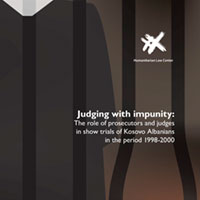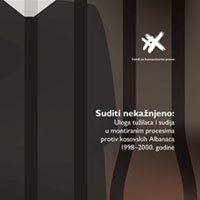Judging with impunity: The role of prosecutors and judges in show trials of Kosovo Albanians in the period 1998-2000
 Around the end of 1996 and the beginning of 1997, the offices of district public prosecutors began indicting Kosovo Albanians en masse, pursuant to Article 125 of the CCY (with reference to terrorism) and Article 136, paragraphs 1 and 2 of the CCY (with reference to association for the purpose of conducting hostile activities). The trials for the above-cited charges were conducted by district courts in Kosovo during 1998 and 1999, more specifically until 9 June 1999 when the Kumanovo Agreement was signed and the army and police began their withdrawal from the territory of Kosovo.
Around the end of 1996 and the beginning of 1997, the offices of district public prosecutors began indicting Kosovo Albanians en masse, pursuant to Article 125 of the CCY (with reference to terrorism) and Article 136, paragraphs 1 and 2 of the CCY (with reference to association for the purpose of conducting hostile activities). The trials for the above-cited charges were conducted by district courts in Kosovo during 1998 and 1999, more specifically until 9 June 1999 when the Kumanovo Agreement was signed and the army and police began their withdrawal from the territory of Kosovo.
With the withdrawal of the military and police forces, all prisoners were taken from Kosovo prisons and transferred to prisons in Serbia proper. The transfer of detainees ran alongside the transfer of cases to courts in Serbia.
The criminal cases transferred from Kosovo were heard by Serb judges from Kosovo, but also by judges from Serbia who had been previously transferred to Kosovo to help their colleagues with the caseload.
The period 1998-2000 saw an enormous number of political trials of Kosovo Albanians before district courts in Serbia. The passing of the Amnesty Law in 2001 brought an end to the proceedings against Kosovo Albanians. The amnesty provided for a bar to further prosecution, release from prison, and removal of convictions from the official records. The criminal act of terrorism was not covered by the amnesty, as a result of which it can still be prosecuted.
The next Amnesty Law, promulgated in 2002, granted amnesty to Yugoslav nationals who had committed or were suspected on reasonable grounds of having committed the following criminal acts in the territory of the municipalities of Preševo, Medveđa and Bujanovac (Southern Serbia) between 1 January 1991 and 31 May 2001: terrorism under Article 125 or the criminal act of association for the purpose of conducting hostile activities under Article 136 of the CCY. The amnesty also entailed immunity from any further criminal prosecution and an immediate release from prison.
The report examines in detail numerous infringements of fundamental human rights that took place in the course of the proceedings, the way prosecutors and judges handled these cases, the failure to investigate allegations made by defendants that torture and inhumane treatment was used against them during preliminary proceedings to extract confessions from them, the denial of the defendants’ right to be given adequate time and facilities to prepare a defence, right to the assistance of an interpreter, right to be served with a judgment in writing within the time limit prescribed by law, and right to present evidence and have their evidence examined in accordance with law, along with other violations, which all amounted to gross violations of the right to a fair trial as guaranteed by the domestic and international regulations which were in force at the time.
In addition to documenting the violations of these guaranteed rights, this report also points to the fact that the great majority of the judges and prosecutors who handled these cases still hold judicial offices. Some remained in their jobs, many were promoted and serve among the highest-ranking judges or prosecutors, and some continued to work for various state agencies or became lawyers.
The Report Judging with impunity: The role of prosecutors and judges in show trials of Kosovo Albanians in the period 1998-2000 is available here.







